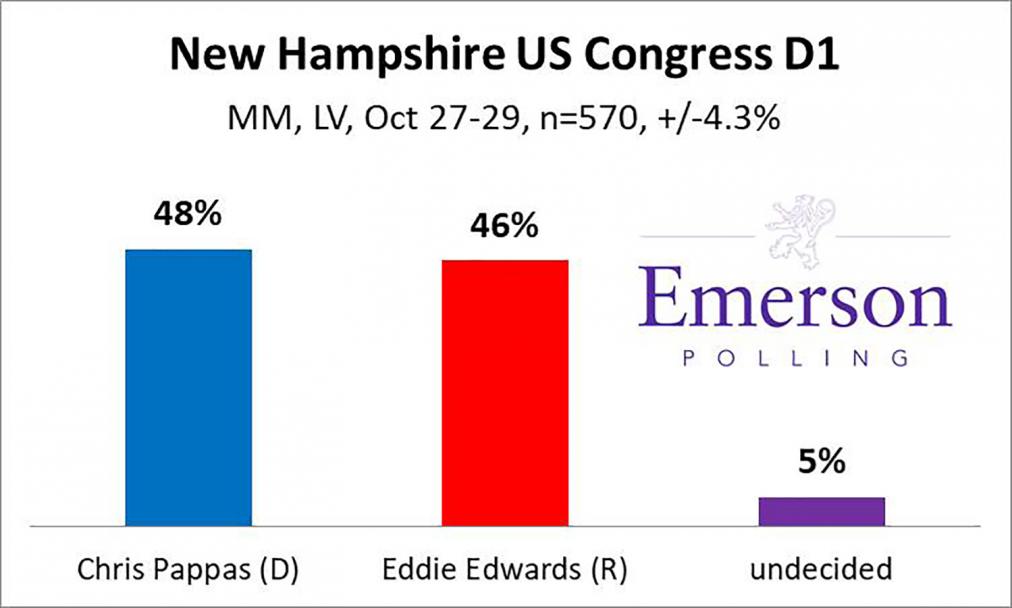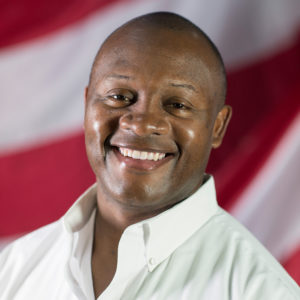When news broke that Nancy Pelosi’s House Majority PAC was dumping $678,000 in NH-01 to attack Republican Eddie Edwards, Granite State politicos wondered what was up. Now we know.
A new Emerson poll finds: “New Hampshire’s 1st district Chris Pappas (D) 48% is trying to hold the seat for the Democrats against Eddie Edwards (R) 46%, with 5% undecided.” And Republicans are thrilled.
“The D.C. allies of Nancy Pelosi are starting to realize the same thing we have know all along; with Eddie Edwards, we have the right candidate, the right message, and the right work ethic. Eddie is going to win this seat and ensure common sense conservative values are returned to NH-01,” Derek Dufresne, general consultant for Eddie Edwards told NHJournal.

These are surprising numbers in a race that many political pros had written off due to the strength of the Democratic nominee among Republicans and independents, and the overall trend of increasing Democratic strength in national polls. For example, the latest USC Dornslife/LA Times poll gives Democrats a +17 advantage in the generic ballot, according to longtime Democratic strategist Bob Shrum, now director of the Center for the Political Future at the University of Southern California.
“I think something is really going on out there,” Shrum told NHJournal. “I think Democrats are going to win big, I think we’ll pick up 30, maybe 40 seats.”
But Americans don’t hold national elections for Congress. They hold 435 local ones, and right now, the NH-01 race appears to be truly competitive. What happened?
“Republicans are coming home,” says Spencer Kimball, executive director of the Emerson poll. “In our poll a few weeks ago, Pappas was up by 5 points (40-35 percent) with 24 percent undecided. Now the undecideds are just 5 points. And the partisan trend of a slightly GOP-leaning district is starting to show.”
Several GOP consultants have to told NHJournal privately that they believed the only way for Edwards to win was for the race to become nationalized–a vote based on partisanship, not personality. “Hell, half the Republicans I know say they’re voting for Pappas,” one longtime Republican consultant said. And Kimball says it’s true that Pappas has more support from the opposition party (13 percent) than Edwards (6 percent). But Pappas’s bipartisan numbers are sagging while the Republican is holding his own among independents.
Edward’s surprising strength can be attributed to both the Kavanaugh Effect–energizing Republican voters–and the media coverage of the past week, which has increased partisan divisions and highlighted national issues for voters in every state. Chris Pappas wants people to vote for the nice guy who works at the restaurant they like. Eddie Edwards wants Republican and GOP-leaning independents to cast purely partisan votes in a referendum on national politics.
Pappas has run a campaign that has carefully avoided partisan message, and his TV ads explicitly affirm his bipartisan bona fides. He’s also continued to avoid revealing whether or not he would support Nancy Pelosi as speaker–not a question front-running candidates with a clear lead (like Annie Kuster) have to worry about answering.
All of which is an indication that his campaign’s own internal polls show that partisanship is not his friend. Which means every time the media go over-the-top after Trump, or suggest the Republicans are responsible for anti-Semitic violence, the more likely it is those Republicans will stick with their party when they get to the polls.

